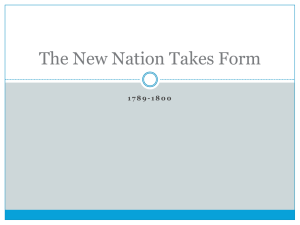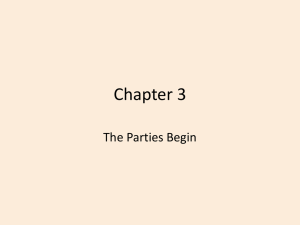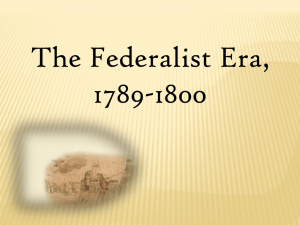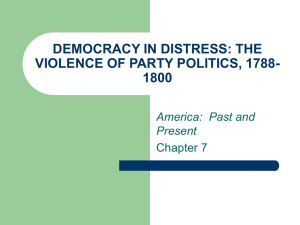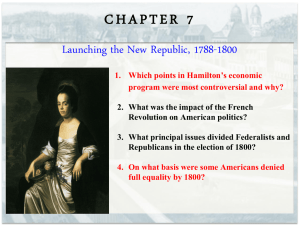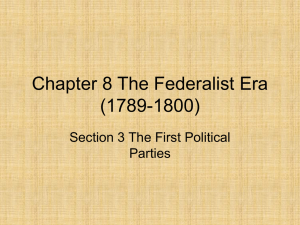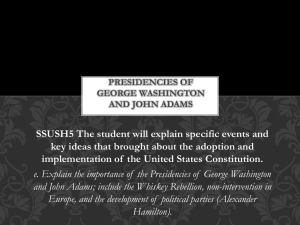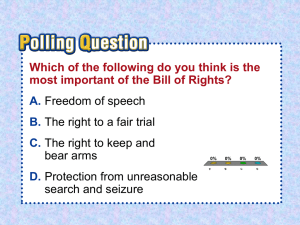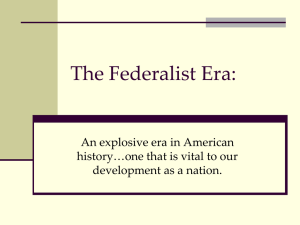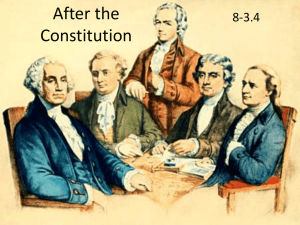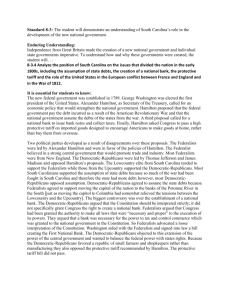Chapter 7 _1_ _1 - Somerset Academy
advertisement
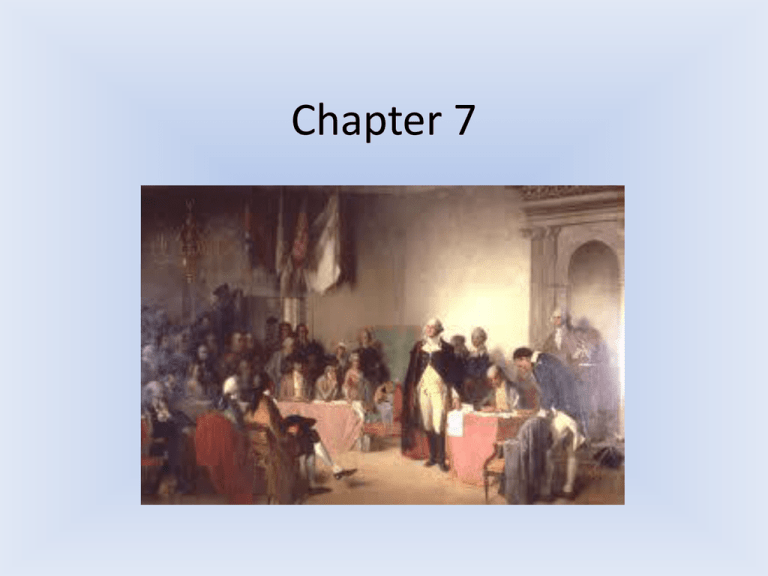
Chapter 7 After the constitution • After the ratification of the constitution we begin to see two political parties come into being • The Federalists • Federalists believed in rapid integration into the world economy, and did not trust local government to do so accurately • The Jeffersonians/ Republicans • Put their faith in the people, entrepreneurs free of intrusive governement. The first President • Thanks partially to good press Washington had overwhelming support to become President. • Washington was not brilliant or a great speakers like his peers around him. • He felt he envisioned the goals and ideals of the republic. An attempt to limit the Presidency • Again congress had a great amount of fear about what man could do in power. • It became the idea that the President should not have the ability to dismiss cabinet officials. • Again Madison rallies congress to his call stating that the President could not take confidence in his appointees unless he had control. • Congress then creates the departments of war state and treasury. • Washington thought being selected as president proved the success of the republic. • Population in 1790 was 3.9 million. Secretary of war: Henry Knox Secretary of treasury: Alexander Hamilton Secretary of State Thomas Jefferson The two secretaries Hamilton Jefferson • • • • • • • • • • Wanted to expand democratic principles • This dream came from being able to view the French Revolution. • Believed in America’s power of agriculture • State government • Rights of the farmer • Kept his staff small pushing his idea of small government with only five staff members. Believed in the success of as republican society Young Lawyer Hard Working Charming Ambitious Strove for reputation Strong central government Closer ties to Britain Believes in industry and capitalism Keep power from the people they cannot be trusted to make proper economic decisions. Believed in the success of a republican society Judiciary Act of 1789 Creates the Supreme court. The Court makes sure laws passed by congress are constitutional. 1 chief justice with five associate justices. Creates 13 district courts to also make sure state laws were constitutional. John Jay would go on to be the first chief justice of the supreme court. American Debt In 1790 Hamilton put together a report on the U.S. economy He estimated that the country was 54 million dollars in debt. Most of the debt came from foreign debt during the war. Largest issue facing the Washington Presidency Funding and Assumption Hamilton’s first plan was to restructure America’s debt. Funding: The U.S. Government would buy back old investment bonds at current value and reissue new bonds to those that could afford it. Not supported by Madison feeling only a few would profit. Took advantage of soldiers and farmers who originally bought bonds. Assumption: The U.S. government will attempt to take on it’s debt of the country. Hurt southern states who still needed to pay debt of the north Assumption seemed to support states like Massachusetts which had a sloppy system of keeping track of debt. Hamilton’s Bank Hamilton the proposed the national bank. It would be privately held buying up multiple bonds. It would be federally funded. Jefferson and Madison were against this. Jeffersonian Republicans thought it was strong financial institutions that were the failing of Britain. Washington Thought about vetoing it. Hamilton was able to convince Washington by pointing out Article 1 section 8 of the constitution allowed congress to pass any law that was necessary and proper. The idea of necessary and proper were known as implied powers. Report on Manufacturing Hamilton also created a study explaining how to industrialize the country. This report became a bill that pushed for plan to increase production for commercial trade in America. As well as an increase in protective tariffs. The bill was no passed because it favored states over the southern states. Foreign issues Where political squabbles divided Washington's first four years foreign issues were the subject of the second term. After the French Revolution which Jefferson supported, the French opposed the British. Federalists supported the British due the them being a strong trade partner and their strong central government. Anti federalist (Republicans ) supported the French , based on their ideas during the revolution. Washington chose to keep the country neutral. Dealing with the British In 1794 there were still 1,000 British troops stationed in the North West territories. 75 percent of American imports came from Britain. America also paid the British to have trade rights with the West Indies Britain had disdain for American Rights. Franco- British war A war broke out between Britain and France. Both countries what America on it’s side. Jeffersonian Republicans wanted to join the French, because of their respect for their natural rights, and loyalty after the American Revolution. The federalists wanted to join Britain. For the financial reasons, as well as a respect for strong central government. Genett and the west indies French ambassador Edmund Genett pushed to have American ships seize British ships and goods. Both Washington and Jefferson would put an end of this. The British Would eventually seize ships off the coast of the west indies. Jay’s Treaty John Jay was sent to negotiate the return of American Goods. Hamilton was noted as mentioning that the U.S. would give in to negations easily, which the British found out. The treaty stated that the U.S. would pay for its revolutionary debt to the British. The British would return American goods and the troops would leave the territories. Passing the treaty Congress was mostly against the bill. Southern states did not want to pay back the debt and Jay never mentioned the slaves that the British took from the colonists. In order for the Bill to be passed Washington moved bill to the Senate without House approval stating that House was rebelling against him. Pinckney's Treaty Pinckney met with the Spanish to open up the south and Mississippi to trade. Whisky Rebellion A small rebellion started due to an excise tax on grain distilleries, which hurt farmers and distilleries. Washington assembled an army with Hamilton to put down the rebellion. Upon the arrival the mob had already disbanded. Because they thought the uprising in Pennsylvania was a direct threat to the country. Washington claimed that the rebellion was believed to be on par with the revolution. Republicans thought this was Hamilton using the military to scare Republicans. Farwell address Washington at the end of his term mentioned in his Farwell address that Political factions would lead to the end of the country. The address was oddly written by Hamilton Hamiltonian Scheme • Hamilton did not trust an independent minded Adams • Urged southern Federalists to vote for Pinckney. • It was Hamilton’s hope that Pinckney would be elected and Adams would serve as his Vice President. • New Englanders discover the plot and drop Pickney and vote for Adams. Results • 1796 John Adams elected. • Presidential Candidate Thomas Jefferson had 68 votes vs. 71. • Other candidates were Thomas Pinckney (59 votes), Aaron Burr (30 votes) and others with 48 scattered votes. • End Result • Adams has to work with a Republican Vice President Jefferson. Foreign Policy • With the fallout of Jay’s Treaty John Adam’s had a lot to deal with when it came to French Relations. • The issue that Adam’s was dealing with was U.S. ships being seized by privateers. • Adam’s sent Charles Pinckney, John Marshall, and Elbridge Carry to try and work over issues with the French The XYZ affair • The three delegates from the U.S. were not received well • The delegates were expected to pay a bribe to French Officials as well as a loan for millions • When the information was relayed to congress the agents were known as Xyand Z • This event only worsened tensions between Federalists and anti Federalists. Hamilton called for war with the French. Political Dissent • Post XYZ there was a continued worry about a French invasion and it was believed that an army needed to be built. • the Federalists were continuing to try and find ways to quiet the Republicans and felt a military force was the only way to quiet them. • Instead Adams decided to build a Navy Alien and Sedition • The federalist Majority decided that should try and quiet Republican dissent besides building a military. • Congress would pass the Alien and Sedition act. • The act allowed federal courts and the President to silence Republican dissent. As well as deport those of a foreign nature. • The courts were stacked with Federalist representatives. • Obviously many people were dragged into court. Protest of Alien and sedition • Essentially the acts attacked free speech so there were many people who opposed the acts. Some even spoke of succession from the union. • Both Madison and Jefferson drafted resolutions to the acts • Adams would decide to side with the Virginia resolution
